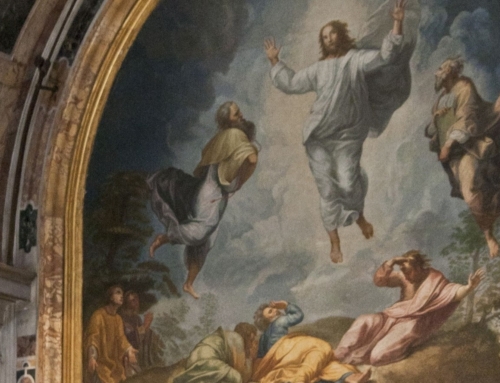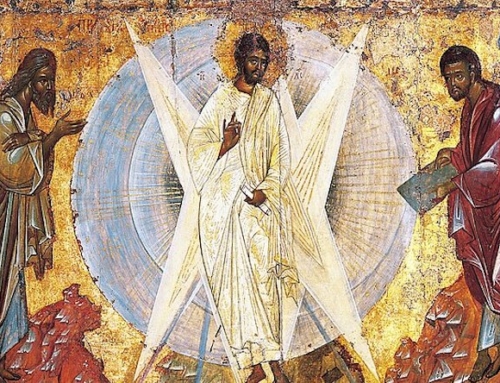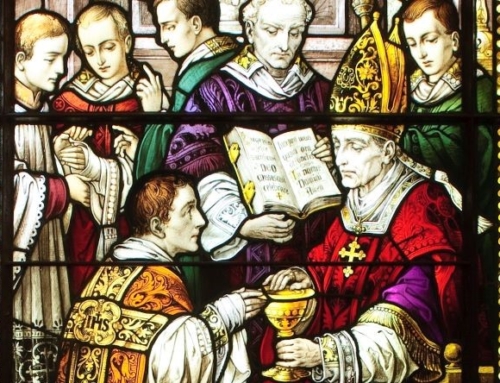“From the days of John the Baptist until now the kingdom of heaven has suffered violence, and men of violence take it by force” (Mt 11:12).
This somewhat puzzling verse reminds me of a biography I once read about Br. Mary Joachim, a Trappist monk from the monastery of Gethsemane in Kentucky. The Man Who Got Even with God tells the story of how this once wild and hot-tempered son of a Kentucky farmer was gradually tamed through the rigors of monastic life. John Green Hanning’s early life was characterized by his motto “I always get even.”
Once as a very young man, he got into a heated argument with his father and, true to form, settled it by burning down a barn full of his father’s freshly cut tobacco. He then ran away to lead the life of a wandering cowboy for several years. He eventually returned home and reconciled with his family. His conversion to God, however, was delayed until the death of his mother a few years later. Reflecting on the love the Lord had shown him through his mother, John decided to “get even with God” by following a desire he had had many years earlier. He asked to be received into the Trappist monastery a few miles from his home. When Hanning asked his fiancée to be released from their engagement she provided him with extra motivation by laughing to his face at the prospect of his settling down to become a quiet, docile monk.
The biography goes on to chronicle the years of Br. Mary Joachim’s slow and painful growth in the spiritual life by the gentling of his fiery temper. One time he received a stiff penance for hunting up a pitchfork to use on one of his brother novices for some perceived offense. On another occasion he had to spend months angrily eating a large portion of meat intended for some guests, but which he had burnt to charcoal. In yet another instance he came within a hair’s breadth of apoplectically slitting his infirm abbot’s throat while shaving him because the abbot, aiming to discover how far his young monk’s patience had developed, began pointing out the brother’s faults. His motivation to persevere through all this, as well as to be stubbornly faithful to his daily prayers and meditations, remained constant: to get even by learning obedience and charity. And get even Br. Mary Joachim did, as he ever so slowly grew into a tractable monk renowned for his gentleness and holiness.
It seems to me that this story exemplifies what Christ meant in saying that violent men take the kingdom of heaven by force. Such men direct all the power of their passions to holy purposes and so merit their salvation. A number of years ago, in a conversation with his colleague John Senior, Professor Dennis Quinn cited a theory that one of the chief causes of neuroses in our time is the suppression of anger. Well intentioned people sometimes try to curb violence by simply suppressing this emotion. Quinn indicated that this is a mistake. Anger, he pointed out, is an emotion that is not bad in itself. It is a passion which provides us with a great energy or force in overcoming things we apprehend as evil. If bottled up, this energy will eventually manifest itself in unhealthy ways. It should instead be fostered, trained, and put to good use in developing the virtues. In other words, it is a strong impetus that we should take advantage of.
St. Paul of the Cross, whose feast is celebrated today (in the USA), was another man who wisely employed his great energy. The founder of the Congregation of the Passion did not have the wayward early life of Br. Mary Joachim, but he likewise dedicated himself to serving God, doing so by spreading devotion to the Passion of Our Lord Jesus Christ. He meditated on, imitated, and preached about the love and mercy of God as revealed to us by the violence Christ endured during his Passion. St. Paul realized that he and his men first needed to be sanctified themselves before they could help save others. Therefore, he established a rigorously ascetic monastic way of life in which they could do violence to their sinful dispositions. He punctuated this life by months of going out to preach to the people of God. St. Paul epitomized an explanation that St. Cyril of Alexandria gave of the Scripture: “Whosoever therefore is a hearer and lover of the sacred message takes it by force: by which is meant, that he uses all his earnestness and all his strength in his desire to enter within the hope.”
✠
Image: Charles M. Russell, Cowboys from the Quarter Circle Box







